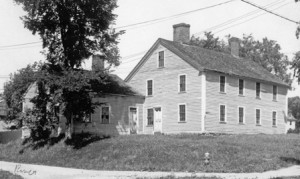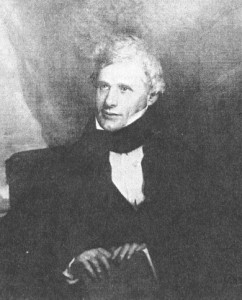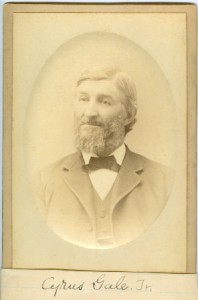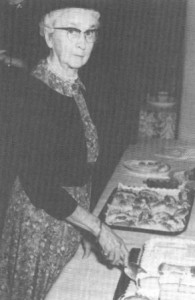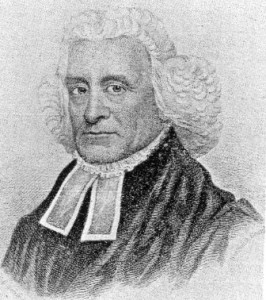By Bob Ellis, Northborough Historical Society
Northborough – Everyone’s list of 10 achievers will be different in part at least. A list completely different from the following might represent the town of Northborough very well.
Of the individuals described below, four did much of their work in the 18th century, three in the 19th, and four in the 20th. Almost never in the past and not often even today have women enjoyed the opportunities of men, but the two on this list demonstrated a degree of leadership uncommon in women of their time that may have inspired the success of younger people who might be considered to have done more.
Samuel Wood (1743-1818)
Captain Samuel Wood, at 32, was older than most of the minutemen who gathered at his home, the present 97 Main St., upon learning of the attack on Lexington April 19, 1775. They had been preparing for conflict but had been officially organized only recently. After
praying under their minister, Peter Whitney, they marched off to serve seven days; Wood and a number of his men then enlisted for three months and 13 days under General Artemus Ward. On May 25 he was commissioned a captain in the provincial army at Watertown.
The 50 minutemen formed a considerable part of the active men of the town. A few of them served longer, but many, like Captain Wood, returned to their duties in town, he as mill-owner and farmer. Later he served as town clerk, treasurer and selectman.
Peter Whitney (1744-1816)
No one in the colonial era exceeded town ministers as influencers of townspeople. Reverend Whitney urged patriotic duty from Northborough’s new soldiers and supported the Revolution enthusiastically.
An example of his dedication to his congregation comes down to us. While he was preaching April 26, 1780, someone thrust a note before him: his house was on fire. Continuing until finished, he found upon returning that his home was no more. He rebuilt, and his carefully preserved parsonage remains at 62 Whitney St.
Whitney also ranks as Northborough’s first historian in one chapter of his history of Worcester County, which he dedicated to Vice President John Adams in 1793. Among the topics he considered were religion, geography, schools and other public institutions, and industries, including one by our next worthy.
Abraham Wood (1752-1804)
This younger brother of Samuel Wood, Whitney noted, dressed 7,000 yards of cloth annually. Abraham Wood was a fuller: a man who scoured, dyed and treated loose webs of fabric to produce woolen cloth. He did this in a building by the Assabet River, the stream assisting in the beating and cleaning of cloth. In the Revolution, after 22 days among his fellow minutemen he returned home. In July of 1777, however, he joined with forces called to reinforce the colonial army near Bennington, Vt., where he was discharged one month and 10 days later.
Wood, one of Northborough’s two composers of music in its small population, dedicated his compositions to religious and patriotic subjects. Some of his manuscripts remain part of the Northborough Historical Society collection. His works continue to be studied and performed. A reference to his name and the word “composer” will bring up over 10,000 references on Google.
John Davis (1787-1854)
After receiving his earliest education at the South School in Northborough, John Davis studied at Leicester Academy and Yale College and then developed a law practice in Worcester. Elected to Congress in 1824 for the first of five terms, he earned the appellation “Honest John.” He served two terms as governor of Massachusetts and then spent most of one term in the United States Senate in the 1840s, where he was one of only two men to vote against the Mexican War. He supported the Wilmot Proviso, a controversial but eventually very influential bill that sought to ban slavery from any territory gained in that war. Later he served
again as governor. During much of this time he was vice president of the American Antiquarian Society. Upon his retirement from politics, the institution named him president.
Despite his long absence from his hometown, he remained in touch with it. He donated a cut-glass christening font to the First Church. His wife was an aunt of Cyrus Gale Jr., whose contributions to Northborough appear below.
Joseph Allen (1790-1873)
Reverend Joseph Allen spent the years from 1816 to 1873 as pastor of Northborough’s First Church. Taking seriously his position as an intellectual leader, he lectured on educational subjects – the first talk, in 1824, on astronomy. Out of these lectures came Northborough’s version of the major adult educational program of 19th-century New England, the lyceum, a movement that began in that decade in Millbury and featured lectures and debates. During most of these years he served as chair of the Northborough Board of Education. Allen and his wife Lucy operated a private school, chiefly for non-residents. One of its students’ achievements was Northborough’s first newspaper, The Meteor.
Allen belonged to the American Peace Society, promoted the temperance movement, and established an admirable relationship with his own children and the others of the town. Like Parson Whitney, the man he replaced, he wrote a history of Northborough. In his spare time he practiced gardening in the parsonage lot on Church Street.
Cyrus Gale Jr. (1824-1907)
It is difficult to name any benefactor of Northborough equal to Cyrus Gale Jr. The son of a prominent man, he continued a number of his father’s activities, including the management of his general store and the administration of the Gale Fund, which supported the town’s poor. He became town treasurer, but he was best known for what he did with his own funds.
He made the largest gift to the town library established in the Town Hall in 1868 and became the first of its trustees. When the need for library building grew, he built it in 1895. He also endowed Assabet Park near the town center. Both remain well-functioning testimonials to his generosity. His wife Ellen M. Gale, active in all his endeavors, made contributions of her own, including a gate for the cemetery, after his death in 1907.
Alice Kimball (1878-1975)
Like her father, Alice Louise Bowes exhibited musical talent. After studying voice at the New England Conservatory, she taught music in the town’s schools, directed many local musical productions, and for over 50 years, played the organ in three Northborough churches at various times.
In her 60s, she in effect began a new career. The first woman elected president of the Northborough Historical Society, she served 11 years, longer than anyone before or since. Many of its meetings took place in the home she shared with her husband, Herbert Kimball, at the end of School Street. She energized an interest in Northborough history that had grown dormant. With some friends she began to reclaim the long-neglected early churchyard on Brigham Street; finally the town pitched in to complete the job. After her long presidency, she became the first curator of the Historical Society. Some of her many talks on historical topics have been gathered in a booklet, “Alice Kimball’s Northborough.”
Edwin W. Proctor (1887-1977)
As a member of the pedagogical Proctor family and student of his sister Fannie at the North School, he inevitably became a teacher. He graduated from Harvard University, studied at the Sorbonne, and taught French at schools in Chicago and Santa Barbara, Calif., and later at the Choate School in Wallingford, Conn., where his students included John Fitzgerald Kennedy, who, Proctor claimed, “had a mind like a sponge.”
Retired and eager to preserve some of the beauty of his town, he gave 73 acres, including the Edmund Hill woods, now a favorite hiking area, to Northborough. Active in the Historical Society, he endowed the construction of its archive as a memorial to Harriet Proctor, another of his sisters. He joined many local organizations, among them the Lions Club, the Youth Commission, the Northborough Public Library trustees, and, reflecting his interest and skill at horticulture, the Worcester Horticultural Society.
Bessie Murray (1902-1979)
Bessie Smith, born in Rindge, N.H., graduated from the college now known as Framingham State University, married Wilfred Murray, and lived in Northborough for over a half century. Of her many interests, the farming life appeared early. In her teens she won a national 4-H canning demonstration championship. She became both master and lecturer of the Northborough Grange and held several offices in the state organization. She served as president of the Northborough Women’s Club and the Garden Club.
In recent decades a number of women have distinguished themselves in Northborough government, but Murray, who held the post of town auditor, was the first woman to represent her district as state representative from 1956 to 1958. One achievement, probably not shared by many of her colleagues, was her record of never missing a session or meeting of a committee to which she was assigned. Thinking that a citizen from another district town needed the opportunity, she declined to run for re-election.
Gregory Goodwin Pincus (1903-1967)
A native of New Jersey, Gregory Pincus demonstrated his versatility at Cornell
University, where he founded and edited the Cornell Literary Review while majoring in genetics. He earned his Ph.D. from Harvard University in 1927 and after further study abroad became an assistant professor there. Disappointed at not being granted tenure, he was hired as a visiting professor at Clark University by Hudson Hoagland.
After working there together, the two men founded the Worcester Foundation for Experimental Biology. In 1954 he purchased a brick building at 30 Main St. that had already been the home of several important local men. During the 1950s and ‘60s, he and M. C. Chang, with help from Dr. John Rock, developed the first practical birth control pill. There can be no doubt that the pill changed the course of American society as few other scientific achievements have done. Once denied tenure at Harvard, Pincus was elected to the National Academy of Science in 1965.
A few notes on the author: Shortly after joining the Northborough Historical Society in 1988, I was named to a group planning an historical picture book on the town. We failed at the time (a dozen years later such a book appeared), but the preparation for it awakened me to the rich history of Northborough. In 1995, although without a strong historical background, I thought that 35 years of teaching English language and literature, chiefly at Worcester State University, had made me reasonably familiar with historical research and might prove me acceptable as its historian. It has been for me a most enriching and rewarding experience.






